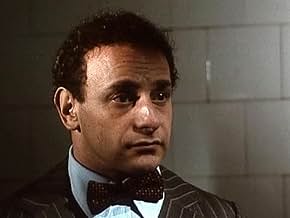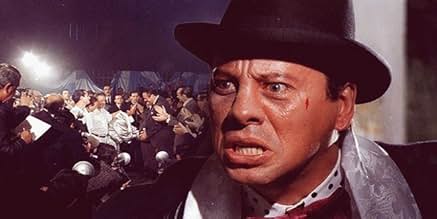José María Gatica fue uno de los boxeadores argentinos más populares de los años cuarenta. Pese a su talento, no supo aprovecharlo y fue autodestuyéndose, despilfarrando el dinero y dejando ... Leer todoJosé María Gatica fue uno de los boxeadores argentinos más populares de los años cuarenta. Pese a su talento, no supo aprovecharlo y fue autodestuyéndose, despilfarrando el dinero y dejando de lado los entrenamientos por la vida nocturna.José María Gatica fue uno de los boxeadores argentinos más populares de los años cuarenta. Pese a su talento, no supo aprovecharlo y fue autodestuyéndose, despilfarrando el dinero y dejando de lado los entrenamientos por la vida nocturna.
- Dirección
- Guionistas
- Elenco
- Premios
- 7 premios ganados y 6 nominaciones en total
Eduardo Cutuli
- Fioravanti
- (as Cutuli)
- Dirección
- Guionistas
- Todo el elenco y el equipo
- Producción, taquilla y más en IMDbPro
Opiniones destacadas
José María Gatica was an Argentine pugilist born in extreme poverty (he never attended school). His technical skills were not up to the best, but he compensated with a wild, free swinging ring style; he came out at the bell throwing non-stop punches and always fought to the bitter end. Extremely popular, he attracted the attention of President Juan Domingo Perón, a boxing enthusiast, who helped finance a trip to the US in quest of a world title. This dream was shattered when he fought World Champion Ike Williams in a non-title bout and suffered a first round knockout. This marked a steady decline in his career although his popularity was unabated for a while. Even people indifferent to boxing were excited by the series of brawls Gatica fought with his arch-rival Alfredo Prada, as legendary as the Sugar Ray Robinson - Jake LaMotta bouts were for Americans.
An improvident man, Gatica squandered or gave away his (at times considerable) income and ended up in poverty. A fervent Peronist, his problems were compounded when, after Peron's overthrow in 1955 he was persecuted and his boxing license was revoked. His old ring rival Prada gave him a job in his restaurant, but at the end of his life he was reduced to selling knick-knacks in soccer games. He was forgotten by his fans, although (in an ironic but not unusual twist of fate) there was an outpouring of popular grief at his funeral.
Gatica el Mono (Mono,"monkey" was one of Gatica's nicknames) makes a good job of putting Gatica's life on screen. Edgardo Nieva plays Gatica to perfection, aided by his striking resemblance to the the original. The whole film rests on Nieva's shoulders (this was his first acting credit). He is supported by an excellent cast. Leonardo Favio's direction tends to the melodramatic here and there, but this is probably intended; after all, Gatica's life seems to have been written by a Hollywood scriptwriter. The cinematography is lush, which suits the subject, and the reconstruction of time and place flawless. Music should perhaps have been toned down in some scenes. Boxing scenes are brutal and realistic. A good movie overall.
An improvident man, Gatica squandered or gave away his (at times considerable) income and ended up in poverty. A fervent Peronist, his problems were compounded when, after Peron's overthrow in 1955 he was persecuted and his boxing license was revoked. His old ring rival Prada gave him a job in his restaurant, but at the end of his life he was reduced to selling knick-knacks in soccer games. He was forgotten by his fans, although (in an ironic but not unusual twist of fate) there was an outpouring of popular grief at his funeral.
Gatica el Mono (Mono,"monkey" was one of Gatica's nicknames) makes a good job of putting Gatica's life on screen. Edgardo Nieva plays Gatica to perfection, aided by his striking resemblance to the the original. The whole film rests on Nieva's shoulders (this was his first acting credit). He is supported by an excellent cast. Leonardo Favio's direction tends to the melodramatic here and there, but this is probably intended; after all, Gatica's life seems to have been written by a Hollywood scriptwriter. The cinematography is lush, which suits the subject, and the reconstruction of time and place flawless. Music should perhaps have been toned down in some scenes. Boxing scenes are brutal and realistic. A good movie overall.
This is probably one of the worst films of all time. Bad in all departments, it is an insult to the audience that certain people praise this mistake.
There is nothing good to rescue from this piece of trash. In comparison, any film directed by Enrique Carreras is much better.
Even though, the only good thing featured in this disaster is the Mariano Mores theme "Tanguera", which was better recorded in 1955 by the Francini-Pontier orchestra for RCA Victor.
There is nothing good to rescue from this piece of trash. In comparison, any film directed by Enrique Carreras is much better.
Even though, the only good thing featured in this disaster is the Mariano Mores theme "Tanguera", which was better recorded in 1955 by the Francini-Pontier orchestra for RCA Victor.
To the average film-goer, the name Jose Maria Gatica known as "El Mono" (That's Spanish for Monkey) means little or nothing. But, to South American and Argentine fans, the name brings back memories of a colorful, romantic, and controversial time in Argentine history.
Jose Maria Gatica was born in extreme poverty in the capital of Buenos Aires, Argentina. He learned to fight in the streets and was discovered by Nicolas Preziosa who turned Gatica into "El Mono" and made him the nations greatest boxing idol of the mid 1940s & early 1950s. Noted for his "hurricane" style of punching, Gatica racked up an impressive knockout streak and became the toast of the country. Argentina's dictator General Juan Peron and his beautiful wife Evita were ringside for most of his fights. He had a pet lion, drank the finest wines from a host of beauties high-heeled shoes. He dressed in silk suits & dined and danced in the best clubs.
However, knockout losses, and his "fast-living" spelled his complete downfall. And fall he did. Deserted by his fans, shunned by Peron, he quickly faded from the scene after having scored a remarkable 72 knockout victories. He ended up a sad sight; broke, selling nic-nacs in the street. He died at age 38 after being run-over by a bus.
This is a disturbingly, well-acted film. It captures a time now long gone. In some ways, it's the story of all us........chasing dreams....dreams of love.......dreams of glory.......dreams of riches....sadly, in many cases, those dreams have passed us by......as has the legend of Jose "El Mono" Gatica,once the idol of his nation.
Jose Maria Gatica was born in extreme poverty in the capital of Buenos Aires, Argentina. He learned to fight in the streets and was discovered by Nicolas Preziosa who turned Gatica into "El Mono" and made him the nations greatest boxing idol of the mid 1940s & early 1950s. Noted for his "hurricane" style of punching, Gatica racked up an impressive knockout streak and became the toast of the country. Argentina's dictator General Juan Peron and his beautiful wife Evita were ringside for most of his fights. He had a pet lion, drank the finest wines from a host of beauties high-heeled shoes. He dressed in silk suits & dined and danced in the best clubs.
However, knockout losses, and his "fast-living" spelled his complete downfall. And fall he did. Deserted by his fans, shunned by Peron, he quickly faded from the scene after having scored a remarkable 72 knockout victories. He ended up a sad sight; broke, selling nic-nacs in the street. He died at age 38 after being run-over by a bus.
This is a disturbingly, well-acted film. It captures a time now long gone. In some ways, it's the story of all us........chasing dreams....dreams of love.......dreams of glory.......dreams of riches....sadly, in many cases, those dreams have passed us by......as has the legend of Jose "El Mono" Gatica,once the idol of his nation.
I saw this film in Argentina in 1995 on television. This film is perhaps one of the greatest boxing and biopic film ever made in my opinion.
Even if you're not a boxing fan, You'll enjoy the beautiful color this film was photographed in. This film tells the story of an Argentinian boxer who becomes famous and falls faster than the Jake Lamotta character in Raging Bull. Add to all of this the historical background Gatica takes place in. In one of the more amazing scenes I have ever seen the character of Gatica has just lost his son but is more grief stricken by the death of Eva Peron who he has just visted on her death bed. Gatica is a socially detached character who seems to function according to his own rules. He is a womanizer and a brute but the film unlike Raging Bull does not ask us to judge him but to feel what he feels. Gatica is swept up by history even though according to himself he was'nt even that good and did'nt even want to fight. You have to admire the director who makes a Film and not some boring "Playhouse" drama. The film answers some of the toughest questions posed by visual planning scenes out and some great editing and music soundtrack which takes you through the times of 1940's & 50's.
Even if you're not a boxing fan, You'll enjoy the beautiful color this film was photographed in. This film tells the story of an Argentinian boxer who becomes famous and falls faster than the Jake Lamotta character in Raging Bull. Add to all of this the historical background Gatica takes place in. In one of the more amazing scenes I have ever seen the character of Gatica has just lost his son but is more grief stricken by the death of Eva Peron who he has just visted on her death bed. Gatica is a socially detached character who seems to function according to his own rules. He is a womanizer and a brute but the film unlike Raging Bull does not ask us to judge him but to feel what he feels. Gatica is swept up by history even though according to himself he was'nt even that good and did'nt even want to fight. You have to admire the director who makes a Film and not some boring "Playhouse" drama. The film answers some of the toughest questions posed by visual planning scenes out and some great editing and music soundtrack which takes you through the times of 1940's & 50's.
Great tense movie. Sad story of José María Gatica "The Monkey" looks like you're in a theatre watching the tape.
Very raw and artistic movie. Directed by Leonardo Favio.
Total drama.
Very raw and artistic movie. Directed by Leonardo Favio.
Total drama.
¿Sabías que…?
- TriviaOfficial submission of Argentina for the 'Best Foreign Language Film' category of the 66th Academy Awards in 1994. However, it was pulled out of the competition by director Leonardo Favio himself as form of complaint about the problems of the film industry.
- Bandas sonorasTengo mil novias
Written by E. Cadicamo & E. Rodríguez
Selecciones populares
Inicia sesión para calificar y agrega a la lista de videos para obtener recomendaciones personalizadas
Detalles
- Fecha de lanzamiento
- País de origen
- Idioma
- También se conoce como
- Gatica, the Monkey
- Locaciones de filmación
- Productoras
- Ver más créditos de la compañía en IMDbPro
- Tiempo de ejecución2 horas 16 minutos
- Color
- Mezcla de sonido
Contribuir a esta página
Sugiere una edición o agrega el contenido que falta






















